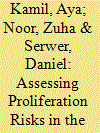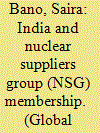| Srl | Item |
| 1 |
ID:
192146


|
|
|
|
|
| Summary/Abstract |
Whether the Iran nuclear deal rises from the ashes or not, the United States and Europe now need to focus on preventing a nuclear arms race in the Middle East. Turkiye and Saudi Arabia are the most likely to respond to Iran’s becoming a nuclear-threshold state. Both have good reasons to think twice before proceeding, but their current leaders have made statements that arouse concern. Egypt might find it hard not to follow in their wake. With Israel and Iran, there would then be a prospect of five rivalrous nuclear powers in close proximity in a volatile region. Avoiding this scenario will require careful analysis of nuclear capabilities in the potential proliferating states; intense diplomacy among the US, Europe and the potential proliferators; and a broader regional-security framework for threat assessment that does not exist today.
|
|
|
|
|
|
|
|
|
|
|
|
|
|
|
|
| 2 |
ID:
151613


|
|
|
|
|
| Summary/Abstract |
The new constraints on, and monitoring of, Iran’s nuclear programme could be held as the gold standard for a strengthened non-proliferation regime.
|
|
|
|
|
|
|
|
|
|
|
|
|
|
|
|
| 3 |
ID:
139217


|
|
|
|
|
| Summary/Abstract |
The Nuclear Suppliers Group (NSG) was founded in 1974 in response to the Indian nuclear test in order to prevent nuclear proliferation by controlling nuclear exports. In 2008, the NSG exempted India from its full-scope safeguards (FSS) condition, making it the first country to be allowed to have nuclear trade with NSG members while retaining its nuclear weapons program. India won this waiver after tough negotiations and having resisted tough nonproliferation conditions. India is now bidding for NSG membership. This paper analyses the prospects for the membership in light of the waiver negotiations and how the waiver negotiations can guide us in assessing the likely path of the membership negotiations. This study concludes that India will resist any conditions and the US and India have to invest massive diplomatic efforts to reach a formula that addresses the nonproliferation concerns of member states.
|
|
|
|
|
|
|
|
|
|
|
|
|
|
|
|
| 4 |
ID:
135250


|
|
|
|
|
| Summary/Abstract |
The Fissile Material (Cutoff) Treaty (fm(c)t) has been on the negotiation agenda since 1996, but has seen little progress. This is due to a fundamental disagreement over whether emphasis should be placed on nuclear disarmament or nuclear non-proliferation. Several delegations perceive the fm(c)t as a tool to draw in states from outside the non-proliferation regime, while others understand it to be a disarmament measure that reduces quantities of fissile materials for nuclear weapons. They however, regard the unwillingness of nuclear weapon states to engage toward this end as deeply unjust. Additional disagreements also concern justice: Should there be different standards of verification? May some states continue to produce unverified military fuel? As long as the nuclear weapon states only push their interests through pure power instead of respecting the notion of justice, no progress can be expected and the non-proliferation regime will further erode.
|
|
|
|
|
|
|
|
|
|
|
|
|
|
|
|
| 5 |
ID:
008049


|
|
|
|
|
| Publication |
Winter 1995.
|
| Description |
31-39
|
|
|
|
|
|
|
|
|
|
|
|
|
|
|
|
| 6 |
ID:
082441


|
|
|
|
|
| Publication |
2008.
|
| Summary/Abstract |
Members of the IAEA Board and of the Nuclear Suppliers Group may need to decide this year whether to go along with the US proposal to allow nuclear cooperation with India despite its non-NPT status. Permitting nuclear sales to India would have important geo-strategic benefits by strengthening its partnership with the US. Yet granting India an exception to nuclear supply guidelines would also have significant non-proliferation disadvantages by weakening the NPT. Whether it would assist India's nuclear weapons development is unclear. If India were to agree voluntarily to cap its production of fissile material, this would rectify the greatest lost opportunity of the US-India nuclear agreement. The non-proliferation benefits that the Bush Administration has claimed for the accord, such as that it brings India into consensus on the Iran nuclear issue, are neither guaranteed nor long-lasting. Perhaps the best that can be said is that the transparency the accord will bring to some aspects of the Indian nuclear program could contribute to arms control measures in the future.
|
|
|
|
|
|
|
|
|
|
|
|
|
|
|
|